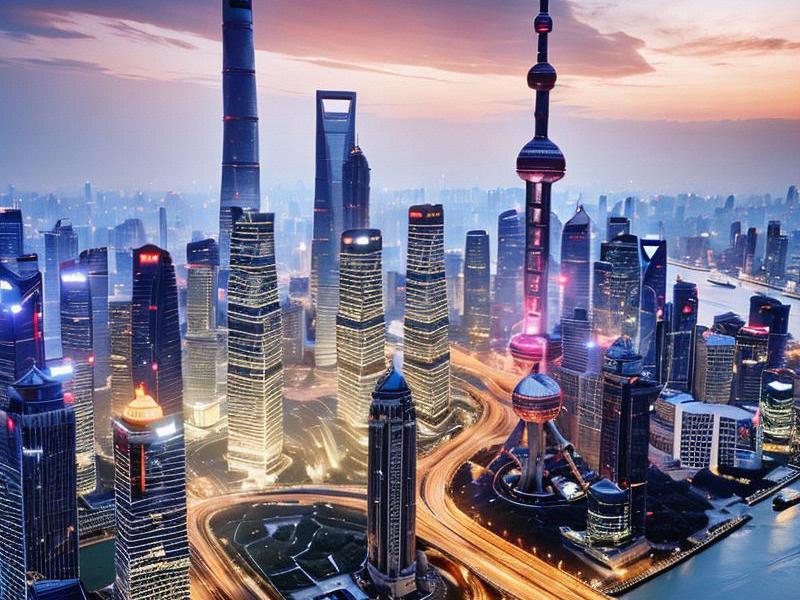Shanghai: A Dynamic Metropolis of Innovation and Culture
⏱ 2025-05-02 16:17 🔖 上海龙凤419
📢0℃

Shanghai, often referred to as the "Pearl of the Orient," stands as a beacon of modernity and progress on the eastern coast of China. With its stunning skyline, rich history, and vibrant culture, Shanghai is not just a city; it's an experience that encapsulates the essence of China's rapid transformation and its aspirations for the future.
The city's journey from a modest fishing village to a global metropolis is nothing short of remarkable. In the 19th century, Shanghai was forcibly opened to foreign trade, becoming a treaty port and a melting pot of cultures. This historical backdorphas left an indelible mark on the city, evident in its architectural diversity, with a harmonious blend of colonial-era buildings, traditional Chinese structures, and cutting-edge skyscrapers.
Today, Shanghai is the economic powerhouse of China, driving the nation's growth and innovation. The city's skyline is dominated by the iconic Oriental Pearl Tower, the Jin Mao Tower, and the Shanghai Tower, which at 632 meters, is the tallest building in China and the second-tallest in the world. These architectural marvels are not just symbols of Shanghai's economic prowess but also reflect the city's commitment to innovation and modernity.
The financial district, known as Lujiazui, is a hub of global finance, with the Shanghai Stock Exchange being one of the largest in the world. This area has attracted multinational corporations, financial institutions, and tech startups, making Shanghai a key player in the global economy. The city's strategic location on the Yangtze River Delta, one of the most economically active regions in China, further enhances its importance.
上海龙凤千花1314 Beyond the realm of finance, Shanghai is a cultural capital, celebrated for its art, fashion, and cuisine. The city hosts numerous international festivals and events, such as the Shanghai International Film Festival, the Shanghai Fashion Week, and the Shanghai World Expo, which have cemented its reputation as a global cultural hub. These events not only showcase Shanghai's rich cultural heritage but also its ability to embrace and integrate diverse cultures.
The Bund, a historic waterfront area, is a testament to Shanghai's colonial past and its transformation into a modern city. It offers stunning views of the Pudong skyline, with the iconic skyline of Lujiazui standing as a symbol of the city's rapid development. The Bund is lined with restored historical buildings that now house restaurants, shops, and museums, providing visitors with a glimpse into the city's history and its vibrant present.
Shanghai's culinary scene is another aspect that makes it a must-visit destination. The city is renowned for its diverse and sophisticated cuisine, blending traditional Chinese flavors with international influences. From the famous xiaolongbao (soup dumplings) to the delectable Shanghai-style steak, the city's food scene offers something for every palate. The bustling night markets and elegant restaurants provide an authentic culinary experience that reflects the city's cosmopolitan nature.
The city's commitment to sustainability and green development is also noteworthy. Shanghai has been at the forefront of China's efforts to combat climate change and promote environmental sustainability. Initiatives such as the construction of green buildings, the expansion of public transportation, and the promotion of renewable energy sources demonstrate the city's dedication to creating a sustainable future.
上海品茶工作室
One of the most ambitious projects in this regard is the construction of the Xiong'an New Area, a state-level new area located near Beijing. This project aims to promote the coordinated development of the Beijing-Tianjin-Hebei region and reduce over-reliance on Beijing. While not directly in Shanghai, this project reflects the broader national strategy of regional development and sustainability, which Shanghai is also actively contributing to.
Shanghai's educational institutions are another source of pride for the city. Renowned universities such as Fudan University and Tongji University attract students and researchers from around the world, fostering a vibrant academic environment. These institutions are at the forefront of research and innovation, contributing to the city's economic and technological advancements.
The city's infrastructure continues to evolve, with ongoing projects aimed at enhancing connectivity and improving the quality of life for its residents. The Shanghai Maglev Train, the world's first commercial high-speed magnetic levitation train, connects the city center to Pudong International Airport in just seven minutes, showcasing the city's commitment to cutting-edge technology and efficient transportation.
上海龙凤419 Shanghai's role in global affairs is also significant. As a member of the World Trade Organization and a host city for numerous international summits and forums, Shanghai plays a crucial role in shaping global policies and promoting international cooperation. The city's leadership in areas such as finance, trade, and technology has earned it a reputation as a global city.
However, the rapid pace of development in Shanghai has not come without challenges. Issues such as housing affordability, traffic congestion, and environmental concerns are being addressed through innovative solutions and sustainable practices. The city's government is committed to ensuring that the benefits of development are shared by all, while preserving the unique character and culture of the city.
In conclusion, Shanghai is a dynamic metropolis that embodies the spirit of China's transformation and its aspirations for the future. It is a city that seamlessly blends tradition with modernity, offering a rich cultural experience, a thriving economy, and a commitment to sustainability. As Shanghai continues to evolve, it remains a symbol of China's rise as a global power and a testament to the potential of urban development.
Shanghai's Renaissance: A Journey Through the Modern Metropolis【梧桐树下的红妆与素手:上海知识女性的百年突围】Shanghai Beauties: A Glimpse into the Elegance and Diversity of Shanghai Women《海派佳人:上海美女的百年时尚演变史》Shanghai 4500: Quantum Delta Synergy and the Photonic Civilization MatrixShanghai Beauties: A Journey Through the Beauty of the City and Its People【夜色经济学:上海高端社交场所的百年嬗变】Shanghai 4550: Quantum Apex Aesthetics and the Galactic Femininity Nexus《潮汐之间:上海都市圈的文化褶皱》《鎏金年代:上海娱乐会所的时空折叠》

